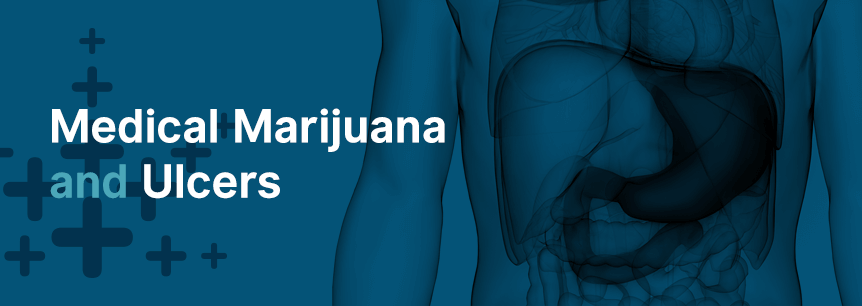
Ulcers are a painful yet common condition for many. Treatments have expanded over the years to include numerous classes of medicines. And today, thanks to changing laws, medical marijuana is now a part of the arsenal doctors have to help treat ulcers and other stomach problems. Though scientific studies are still in their initial stages for understanding how well weed works for treating ulcers, the preliminary results are promising.
Medical marijuana could help heal your ulcers or other stomach ailments through its action on stomach acid and ability to ease the pain. Ulcers can cause severe discomfort for weeks while they recover, and cannabis can help reduce the ache in your gut. Discover what medical marijuana can do for your stomach pain and how you can get relief from your ulcer with it.
If you want to add to your doctor’s treatment regime or replace it, discuss cannabis with a marijuana doctor for your ulcers. Some studies have shown smoking marijuana to be linked to reduced stomach acid production. With lower stomach acid levels, ulcers can heal naturally with less irritation and less pain.
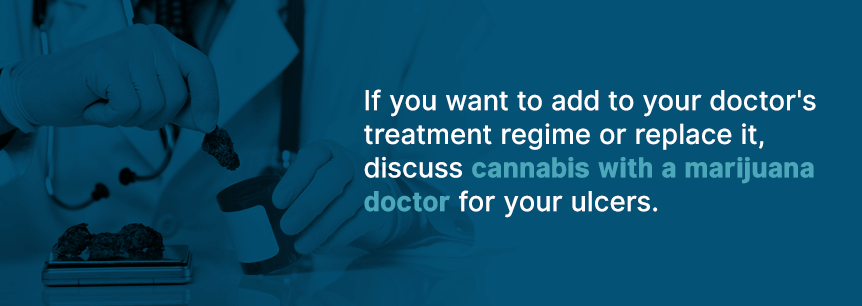
Cannabis also helps alleviate nausea and pain, common complications with ulcers. But even more important are the results of animal studies suggesting that endocannabinoids can protect the digestive system from the ill effects of stomach acid and inflammation. Though human studies are still pending, these animal studies have shown promising results for the use of medical cannabis for digestive disorders such as ulcers and irritable bowel syndrome.
A certified cannabis doctor can help you decide if cannabis can help your ulcers. Every medical case is different, and your personal health history and current condition will factor into how your physician determines to treat you. But you can also ask about treatments you are curious about, such as medicinal marijuana. You need a doctor’s recommendation for this treatment, so don’t be afraid to ask.
Find A Doctor Find A Dispensary
For protecting the stomach from irritation by NSAIDS, scientists from West Virginia University studied mice that ingested THC. The study suggests that the THC in marijuana may protect the stomach from NSAIDS, helping to prevent ulcers or even treat existing ones. If you are interested in using medicinal cannabis for ulcers, a strain containing higher amounts of THC may help if the study results hold for humans.
Smoking marijuana could upset your stomach. If you find that it does, consider switching to tinctures, edibles or oil. But make sure you choose a type with higher THC amounts in it, like sativa. The THC is the component that created such promising results in the mouse study. Additionally, consuming edibles may help to settle your stomach if you have a duodenal ulcer in your small intestine that feels better when you eat.
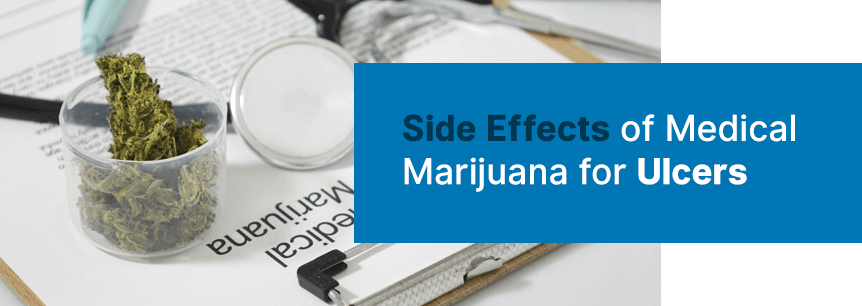
Medicinal marijuana is not without its drawbacks. Always discuss with a physician if the side effects of weed use will offset the symptoms of your ulcer. Smoking has a few side effects not seen with other delivery methods due to the more direct impact the smoke has on the lungs.
Many forms of cannabis share some adverse effects, but do not let the side effects put you off trying medical marijuana. As with any medicine, side effects only impact a small number of patients, and if your doctor has recommended you use cannabis, they believe the benefits are more important for you than any minor side effects that you could experience. Always discuss concerns with your physician or dispensary.
Not everyone will experience all these symptoms. If you find the side effects troubling or if they disrupt your life, talk about the issue with a medical marijuana-certified doctor who knows about your condition and the common side effects of using medicinal cannabis. Do not abruptly stop any medicine, even medicinal marijuana, without first talking to a qualified medical professional.
At MarijuanaDoctors.com, we understand how frustrating it can be to go through weeks of pain with traditional treatment. That’s why we offer a simple means of finding additional treatment options by listing doctors and dispensaries where you live. Search for a cannabis-certified physician in your area who is licensed to recommend marijuana or find a dispensary on our site. Once you find someone qualified to recommend medicinal marijuana to you in your area, you can consult with them to see if cannabis is an option to add to your ulcer treatment regime.
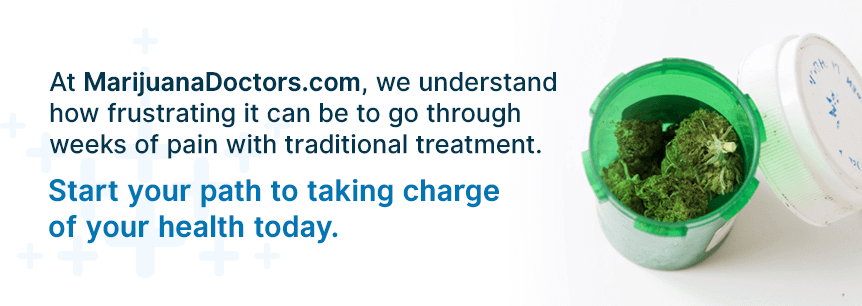
With a quick search, you can get connected to a doctor who has both medical training and knowledge of how to recommend marijuana for health conditions. While medicinal marijuana is never a guaranteed cure, it can help you to feel better while your body heals from the ulcer. Start your path to taking charge of your health today.
Find A Doctor Find A Dispensary
Ulcers are eroded areas in the lining of the stomach or the upper portion of the small intestine. The condition causes pain in the stomach area. This erosion can deepen until it creates a hole in the lining of the stomach or other concerning consequences. Despite their troubling complications, ulcers are a fairly common problem for Americans. In the United States, as many as five million people have this condition, with 500,000 newly diagnosed annually.
Despite what you may have heard, spicy food and stress do not cause ulcers. But if you already have these erosions, the excess acid production from stress or spices may exacerbate the problem. So, if you don’t currently have an ulcer, pile on the pepper sauce — it will not cause an erosion that you don’t have. The same is true for stress. Don’t blame your ulcer on your high-stress job. Instead, the excess acid secreted from your stomach during stressful situations makes the erosions already in your stomach extra painful.
Ulcers occur for one of two reasons. The first cause of ulcers is from overuse of nonsteroidal anti-inflammatory drugs (NSAIDS) such as ibuprofen, naproxen sodium or aspirin. Another reason you may develop ulcers is an infection with the bacteria Helicobacter pylori. Aside from ulcers, the bacteria will not cause any other symptoms. Your doctor will likely do a test for the bacteria to see if you need antibiotics for treatment or if you need to cut down on the NSAIDS in addition to other medications.
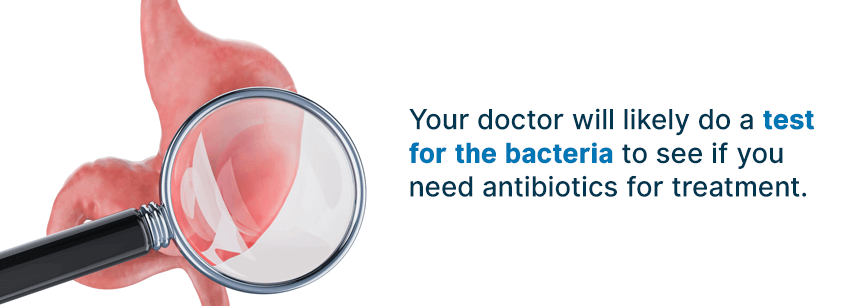
Ulcers cause pain in the stomach, but the location of the erosion causes pain at various times. If you have a stomach ulcer, also known as a peptic ulcer, you’ll feel pain when you eat. Duodenal ulcers in the upper part of the small intestine will cause pain that eases when you eat. Heartburn, stomach pain, and fullness are other signs of ulcers. Taking antacids may relieve the pain, but unlike heartburn pain which completely subsides, ulcer pain will return after a short while.
If you have serious complications, you may vomit what looks like coffee grounds or have tarry stools. These symptoms indicate you have bleeding in your digestive tract. Bleeding ulcers need medical attention immediately.
Without treatment, an ulcer can worsen to create several possible complications, all of which create a danger for your health and require immediate medical care. Extreme pain, blood in your stool or vomiting blood are signs that you’ve developed a bleeding ulcer. Left untreated, a bleeding ulcer can deepen until it perforates the stomach lining. A perforated ulcer can lead to severe infection. Inflammation from an ulcer or scarring from repeated erosions can cause a blockage in your stomach. With your stomach blocked, you may find yourself getting full sooner or vomiting after meals. Weight loss is a common consequence of such a complication.
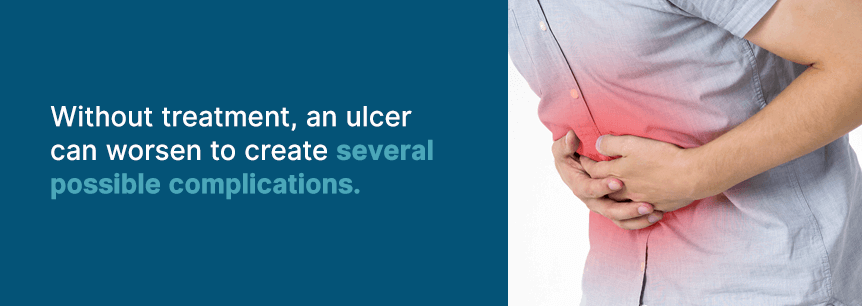
Currently, doctors treat ulcers through various means. Some medications reduce the amount of acid in the stomach. Lowering acid production reduces irritation on the ulcers, helping them to heal naturally. Other medications kill the bacteria that cause the ulcer. Many doctors will prescribe many medicines to kill bacteria and reduce acid.
Today’s ulcer treatment methods are not without problems. Though doctors have a range of options to prescribe patients, all these drugs have potential side effects for the patient. With ulcers and other stomach conditions so common, medications to treat them are even sold over the counter. But how effective and safe are these medications?
Over-the-counter antacids include calcium carbonate tablets or aluminum-containing products. These solutions are cheap but only provide relief for a couple of hours. However, they are not highly useful for treating ulcers because the comfort they bring is temporary. The antacids neutralize some acid already in the stomach without reducing production. The acidity will rebound, causing pain after the antacid wears off.
While these common medicines are shaped like candy tablets, they are still medications that have benefits and harms. Antacids have several side effects depending on their ingredients. Magnesium-based antacids can cause diarrhea whereas aluminum-containing products can cause constipation. More worrisome are the effects on blood mineral levels. Taking too many calcium-containing antacids can cause excessive levels of calcium in the blood, leading to kidney function problems.
H2 blockers bind some of the excess acids in the stomach, reducing its effect on the ulcer. But these drugs are not without problems. H2 blockers have side effects that include sleeping trouble, diarrhea, constipation, dry mouth, headaches, dry skin, and urination problems. Some rarer but more severe side effects of H2 blockers include confusion, irregular heartbeat, wheezing and difficulty breathing. Often, H2 blockers are a preferred treatment option for ulcers, but if you experience troubling side effects, you may need to discuss other options.
Proton pump inhibitors (PPIs) stop some of your stomach’s acid production. Because they stay the production of some stomach acid, these are potent drugs. Over time, less acid in your stomach could have adverse effects.
Long-term effects of PPIs are concerning. You may not absorb the vitamin B12 as well as you should. You may also have a higher chance of getting infected with Clostridium difficile in the intestines. Osteoporosis is also a real possibility with long-term use of PPIs. Some studies have linked use over the years to low magnesium levels and heart attacks. In the short term, PPIs could cause side effects such as a headache, diarrhea, rash, vomiting, nausea and abdominal pain.
Since the cause of most stomach ulcers is an infection with the H. pylori bacteria, antibiotics are usually part of the treatment regime. Most antibiotics tend to cause diarrhea, abdominal pain, bloating, nausea and vomiting. If you do vomit or have severe diarrhea while taking any medication, talk to your doctor about an alternative that won’t sicken you. Vomiting too soon after taking medication could prevent it from being fully absorbed, reducing its effectiveness.
Cytoprotective agents, such as misoprostol and sucralfate, help protect the lining of your stomach and small intestine while you heal from the ulcer. They bind to the ulcer to create a barrier between the ulcer and stomach acid. While these drugs cannot prevent ulcers, they can effectively allow the ulcers to heal. Think of these medications as bandages for the ulcer. Like other drugs, cytoprotective agents also have side effects. For instance, when taking sucralfate, you may experience nausea, insomnia, dizziness, stomach pain, back pain, vomiting, diarrhea or constipation.


Please allow us to access your location to find local dispensaries.
VIEW ALL DISPENSARIES ➔